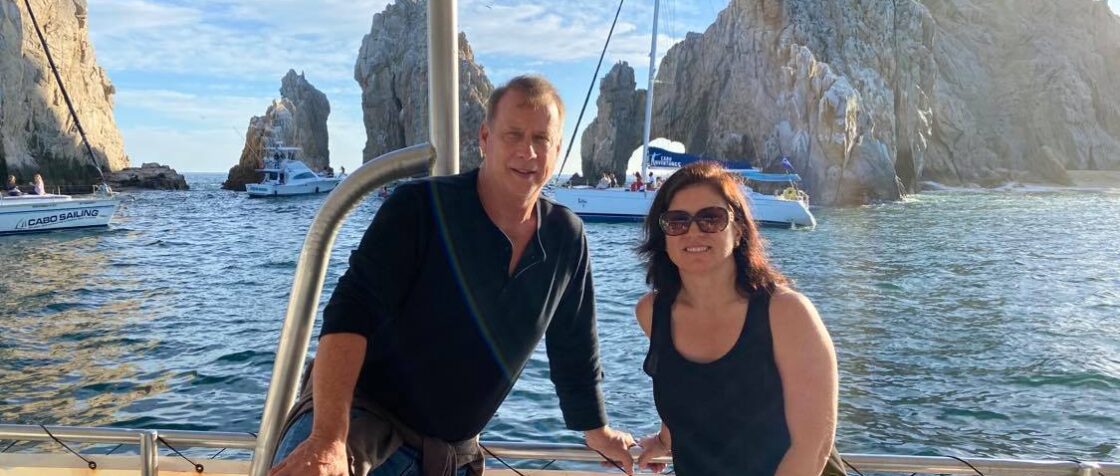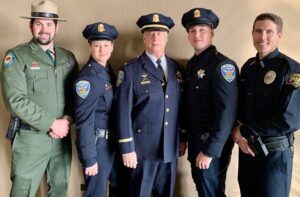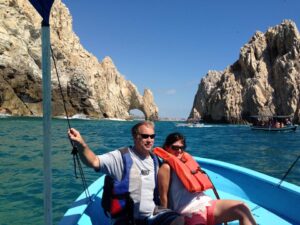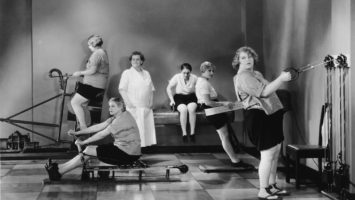
It’s impossible to imagine all of the various challenges that being a law enforcement officer can entail. The physical, mental, and emotional strain are present every single day. There’s no way to accurately predict what might happen from one minute to the next so being as prepared as possible is essential. No matter what comes along, one of the best things anyone can do for themselves is to prioritize fitness in their lives. For a law enforcement officer, this doesn’t only directly affect how well he or she can do their job, but it can also be a life or death determining factor for them or someone else.
Ric Schiff has been a dedicated law enforcement officer for most of his adult life. I have the great honor of saying that he’s one of the best friends I’ve ever had in a group that includes the most amazing friends possible! He’s had a passion for fitness his entire life and understood the need to continue his fitness dedication during his law enforcement career.
If Ric’s name or face seems familiar, you may have seen him on an incredibly powerful Youtube video. Ric and his family suffered an unspeakable tragedy with the loss of his young daughter Crystin. Ric testified in support of the doctor who to this day he faithfully believes cured his daughter of cancer and has done the same for others. You can see that powerful video below and click on the link to learn more about Dr. Burzynski and his ongoing efforts to bring a cure for cancer to those in need.
Ric currently lives on his ranch in Northern California with his lovely wife Laura. Between the two of them, they have 8 children and 4 grandchildren. Ric’s law enforcement experience has been safely handed down as he has a son and a daughter who are on San Francisco Police Department, and a son-in-law who is a Pismo Beach Police Officer. Recently retired, he now gets the well-earned opportunity to continuing living life to the fullest after spending 36 years on the job with the SFPD! It is my pleasure to present my longtime friend and training buddy from college (and often my mentor) Ric Schiff here on Fit Club for you!
Photos courtesy of Ric and Laura Schiff, all rights reserved! (Click on images to enlarge)
Name: Frederick “Ric” Schiff
Age: 61
Occupation: Retired Police Captain SFPD
Location: Clayton, Ca
Fit Club: I recall you played football, rugby, and practiced martial arts and serious weight training. How did you first become involved with sports and fitness and the particular sports that you played?
Ric: I grew up in rural locations, mostly farmland. Everything that we did amounted to requiring physical fitness ….. hiking to fishing, hiking in the hills, chasing animals and snakes. It’s not that we didn’t have toys, but what we did have tended to take us outdoors. Sleds in winter, balls in summer, etc.
Fit Club: Obviously, there’s a need and multiple benefits of training hard to better yourself athletically. What motivated you to continue to dedicate yourself to fitness beyond your sports days?
Ric: I guess initially I trained to be good at what I was doing, football and martial arts. Then I trained to stay safe in my profession (public safety). After enough years of training, I think that it’s just antagonistic to not be in as good of a condition as I can be. You see yourself as physically fit for most of your life, I’m just too competitive to let it go now. There is also a high level of motivation to stem off the onset of aging!
Fit Club: How important was maintaining your fitness during your law enforcement career? Obviously being physically capable of performing all required aspects of the job is critical, but did you find fitness to be of any benefit in terms of stress management or even possibly mental/emotional health?
Ric: To me in my profession, physical fitness was everything. Plenty of overweight poorly conditioned officers justified their lack of fitness by describing themselves as “experts” in various aspects of law enforcement (traffic enforcement for instance). What they were actually doing limited their skill and ability to one or two aspects of the profession, and therefore their utility as officers. I was quite happy to be able to do everything required because of my training and physical fitness. Training is paramount to law enforcement, and physical fitness is paramount to training!
Fit Club: How much time did you have for exercising when you were still working and what types of things did you try to do?
Ric: Never enough! Some of my assignments actually allowed me to work out on duty (tactical for instance). Other assignments tend to allow exercise in the performance of the assigned duties. Most of the officers assigned to the airport would keep track of their 10,000 steps each day. They were able to because the airport was essentially a big donut, so walking in circles was easy to do. Many officers patrol on bicycles, the same principle. Even as a Command Officer at the airport, I choose the stairs when going from floor to floor! Six floors of stairs can be quite a workout. Above and beyond these strategies, most officers have a home or gym-based training regimen. The challenges are the same as other professions, with the added issue that many officers work all night long. That tends to throw off their biological clocks and makes conditioning even more of a challenge!
Fit Club: What were some of the physical challenges you experienced due to the nature of your job? I’m guessing being consistent with your nutrition might have taken some effort when you were on patrol?
Ric: Nutrition was probably the toughest. We tended to eat out often, cooking in-house like firefighters was not possible. Eating on the run is common. Then for night officers, restaurant choices tend to be fast food. After a while, the high level of discipline required by the profession tends to give way to poor eating habits, simply as a temporary mental break. The higher the demands on the officer in my experience, the more likely they were to justify poor food choices.
Fit Club: This past summer was a crazy time for our country and law enforcement was on the front lines during all of it. Is there anything you would like to say or would want people to know about the challenges of that time for you, fitness-related to not?
Ric: Sure. Demoralizing and scapegoating any employee(s) will likely lead to poor job performance. Ask yourself how much sense does it make to vilify and disenfranchise the very people sworn (literally) to protect and serve you? At the end of the day, who are you going to call for help?
There were many other ways to express grievances and to learn to enable understanding. What occurred literally retarded individual officers from performing optimally. That translates to them responding slower to your call for service. When they respond, the spirit of the law goes out the window since any acts of autonomy can result in complaints. That means fewer breaks for you! Then there is the immeasurable damage caused to the officers’ psychological well-being and self-esteem. Pretty much a lose-lose for society.
Fit Club: Obviously age, experience, and circumstance can change things. What types of things are you dealing with now physically that are different from, or perhaps that you didn’t have to deal with, in your 20’s and 30’s?
Ric: Age is a big one. A reduction in buttock muscle mass has had a significant effect on leg performance, so I need to add additional exercise to counter the effects of aging. On the experience end, my workouts are infinitely more efficient since over time I learned more about how to achieve goals (physically) rather than just kill time in the gym, or do what everyone else was doing.
My mindset is also different. I train with my wife. We constantly remind each other that we are training for health. There is no need to push when we are tired, over-exhaust ourselves, and especially to avoid injuries. Even as younger people, but especially as we get older, an injury can mean no workouts for months!
Fit Club: Now that you’ve retired, what’s your main focus in terms of fitness and health and living the life you want in the future?
Ric: Personal health and well-being are paramount. We travel, motor-home, and work on our ranch so we want to be able to enjoy those things. It’s an issue if we go to Cancun to scuba dive and then spend the vacation in our rooms sore after the first day. To avoid that we stay in shape, try to keep good mental attitudes, and eat well. Eating well tends to be the most difficult challenge!
Fit Club: You’ve practiced fitness for a number of decades now. What would you say are some important keys in keeping taking care of yourself a priority that you could pass on to others?
Ric: The first is the proper treatment of injuries, and of course either preventing them in the first place or minimizing the damage when it occurs. In 1993 I ruptured an L4 disc 10 mm. The overwhelming pressure from my doctors was surgery. I resisted but it took several years to rehab. The difference is that I was eventually able to play semi-pro soccer. Had I relented to the surgery, I would have resumed my life quicker but my back would have been a life-long catastrophe. Taking the time to heal injuries naturally has left me in fairly good shape now. Frequent visits to the chiropractor, regular dental, medical, and optometry all contribute to a healthy retirement in the end in my opinion. Obviously, smoking and heavy drinking are antagonistic to long-term health, but I avoided prescription and over-the-counter medications as reasonably as I could.
Taking ibuprofen every night comes at a price. It is a simple solution to pain and soreness, but unquestionably damages the body (kidneys and stomach lining). The other drawback is that it masks symptoms to larger problems. You feel better…. but are you really better? Are you ignoring the tell-tale warning signs that you are over-taxing your body? Any medication that you use which is not specifically addressing an issue, and is not being taken in context is contrary to your well-being! My wife would take Advil every night because her shoulder was sore. We were overworking the shoulder, and the training routine was not appropriate to the injury!
Fit Club: Any future plans or goals (fitness or otherwise) that you would like to share with our readers?
Ric: We travel fairly extensively. Rather than see the world from a vehicle window or porthole, our goal is to get out and experience everything that we can. To do that, we have to maintain a high level of endurance and physical fitness. Now we train high repetitions rather than low/high weight. We are trying to build endurance so that we can enjoy sports, travel, and occasionally unpredictable situations!
Ultimately we are compensating for (or repairing) old injuries and target training to enjoy life as much as we can! The strategy is one day upper body, one day lower, with the third (sometimes fourth day) off. That schedule makes for a limited but still effect time in the gym. Intermittently we swim (to stay in shape for scuba and snorkeling), ride bikes, hike, and even ride electric scooters (for balance). Retirement is great, but only if you keep moving!
Fit Club: Is there anyone you’d like to thank or acknowledge who has been particularly helpful to you in your life or career?
Ric: This is the question I’ve had the hardest time answering. Reflecting back on 61 years, the list of people who have influenced me, including you, is huge. Some of those people I never even met, like MLK. Some people influenced me because they had a negative impact on me and I used them as role models to never emulate, particularly professionally. I wish I could recognize everyone who influenced me, good and bad. Each is equally deserving, and each participated in whatever success, and whatever good that I’ve ever accomplished. I can easily say that the single largest thing that impacted me personally came from watching my brave little daughter slowly die, and how she faced her pain.
Fit Club: Thanks a lot, Ric!








Leave a Reply